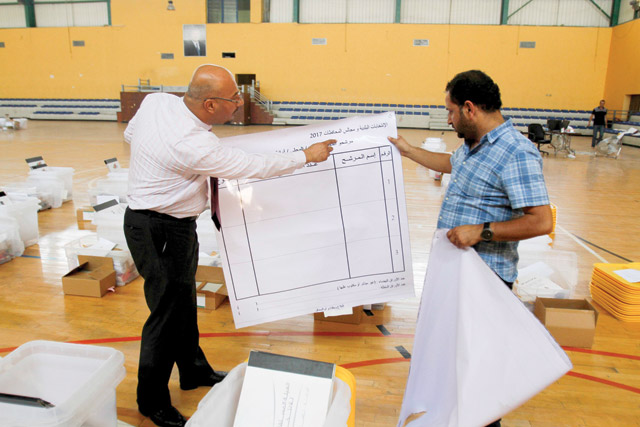AMMAN — Some 4.1 million Jordanians are eligible to cast their votes at the local and municipal elections today.
In Tuesday's elections, Jordanians will elect mayors, members of municipal councils as well as the governorate councils, which will be elected for the first time under the Decentralisation Law.
Elected members of the governorate councils will replace assigned consultative councils for local executive councils, in a bid to enhance the oversight role of citizens and public participation in decision making as developmental planning and allocation of funds will be vested in the new councils.
Article 6 of the law stipulates that the Cabinet will appoint as members of the governorate council, upon a recommendation by the interior minister, no more than 15 per cent of the number of elected members, provided that one- third of this percentage is allocated to women, who also enjoy a 10 per cent quota of the elected members.
Voting for the local twin elections will start across the country at 7:00am and will continue until 7:00pm, unless the Independent Election Commission (IEC) decides to extend voting deadline in some areas, according to the commission.
The Cabinet on Monday announced Tuesday a public holiday to facilitate citizens' participation in the polls.
Voting will take place at some 1,440 voting centres and 5,000 voting stations, IEC President Khaled Kaladeh has said.
A total of 6,623 candidates are competing for the membership of municipal and governorate councils.
The number of candidates running for mayorship stood at 538, while 4,701 are vying for seats at municipal and local councils and 1,239 for membership of governorate councils.
For the Greater Amman Municipality (GAM) council’s membership, some 145 candidates will be competing in the elections.
Around 10 million ballot papers of some 650 different forms have been printed at specialised printing houses to ensure the papers have security marks.
The names of winners will be announced by election committees instantaneously before the special committees audit the results. The results will be broadcast live via several television and radio stations, according to the commission.
The IEC will not carry out local elections in 21 councils across the country, as candidates have won the seats by acclamation. In addition, 68 women have won local council seats uncontested, as they were the sole candidates in their constituencies for local councils that include a seat for women as part of a quota system.
Two local councils did not see female contenders. In this case, the municipalities minister assigns women with the required qualifications to these seats.
The Civil Defence Department (CDD) on Monday announced that it has prepared its plan for the local and municipal elections to ensure the safety of citizens.
The plan includes the mobilisaiton of the department’s personnel, vehicles and equipment to CDD centres close to polling centres, urging voters to avoid crowdedness and festive firing.
Police announced Sunday that they had deployed personnel to safeguard the election facilities.
Rased, a local elections watchdog, announced on Monday that it would be monitoring the local elections through nearly 2,000 observers in polling stations across the country, as well as 250 mobile observers.
The watchdog will also hold a number of press conferences during the voting day to brief reporters on their observations.
Also, the National Centre for Human Rights announced that it will observe the local elections based on internationally recongnised benchmarks, including the flow of the electoral process, the security of the process and ensuing voters’ freewill.
Over 32,000 people will be involved in running the elections, according to Kalaldeh, who added that a total of 1,560 journalists will be covering the elections, in addition to 2,548 observers.
On Sunday, the IEC opened its media centre, which seeks to provide journalists covering the local elections with comprehensive services and regular updates on the electoral process.
The centre, located at Al Hussein Youth City’s Greater Amman Hall, will witness a number of press conferences, briefings to journalists and sessions along the voting day.
Tuesday’s electoral process is expected to cost nearly JD19 million, according to the IEC’s website.
The Jordan Press Association said its operation room will be following up on the electoral process, and will be receiving journalists’ comments and complaints via its hotline 0790111999.
